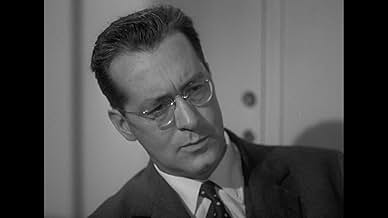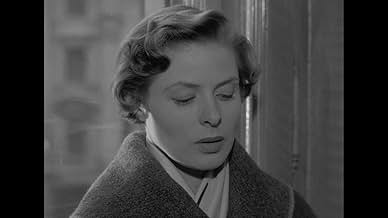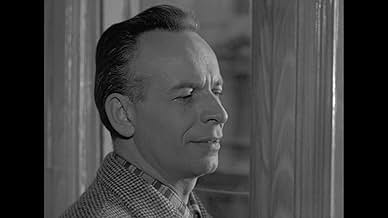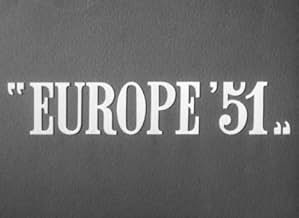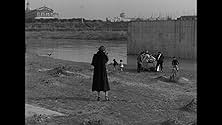CALIFICACIÓN DE IMDb
7.4/10
5.2 k
TU CALIFICACIÓN
Una mujer adinerada se obsesiona con el humanitarismo cuando su hijo pequeño muere después de suicidarse.Una mujer adinerada se obsesiona con el humanitarismo cuando su hijo pequeño muere después de suicidarse.Una mujer adinerada se obsesiona con el humanitarismo cuando su hijo pequeño muere después de suicidarse.
- Dirección
- Guionistas
- Elenco
- Premios
- 4 premios ganados y 1 nominación en total
Carlo Hintermann
- Extra
- (sin créditos)
Antonio Pietrangeli
- Psichiatra
- (sin créditos)
Rossana Rory
- Infermiera della casa di cura
- (sin créditos)
Opiniones destacadas
"Europa 51" may be the best of all the Bergman/Rosselini collaborations of the fifties,outshining such works as "Viaggio in Italia" or "Stromboli,terra de dio". There are two worlds in this god almighty universe:the one in which time is only a quiet river,and the one in which time is killing you.Irène (Bergman)belongs to the former one.Masina's character and Inès,the prostitute to the wrong side of town. When her son committed suicide,Irène was chatting,exchanging trivialities with her posh guests.Eaten with remorse,she realizes her taste for society life took the best of her and now it's too late!
One of her friends opens the gates of a then-unknown world for her:factories where men sweat ,streets where whores roam,slums where mothers strive to feed thir starving children.The man is a Marxist,and he tells Irene about a brand new world where justice and solidarity will be the golden rule.
However,Irene cannot subscribe to this ideology:"This world is not mine because it does not include Michel"-her late son".Beyond that point,the movie turns Christian;Marxist materialism cannot satisfy a desperate woman whose spiritual longing is intense.So she takes altruism to new limits,forgetting all about herself,becoming some kind of Mother Theresa.Christian,too Christian...Her family begins to think she 's lost her mind,and they locked her up in an insane asylum.
Is the ending optimistic or pessimistic?I would opt for the first epithet:behind her bars,Irène can see her new friends come and worship her as a saint.She's lost her wealth,but Michel's death was the beginning of an end for her.Through this redemption,she knows that now,this unfortunate boy forgave her
This is one of Bergman's unfairly forgotten performances.It is accessible and should appeal to a very large public.
One of her friends opens the gates of a then-unknown world for her:factories where men sweat ,streets where whores roam,slums where mothers strive to feed thir starving children.The man is a Marxist,and he tells Irene about a brand new world where justice and solidarity will be the golden rule.
However,Irene cannot subscribe to this ideology:"This world is not mine because it does not include Michel"-her late son".Beyond that point,the movie turns Christian;Marxist materialism cannot satisfy a desperate woman whose spiritual longing is intense.So she takes altruism to new limits,forgetting all about herself,becoming some kind of Mother Theresa.Christian,too Christian...Her family begins to think she 's lost her mind,and they locked her up in an insane asylum.
Is the ending optimistic or pessimistic?I would opt for the first epithet:behind her bars,Irène can see her new friends come and worship her as a saint.She's lost her wealth,but Michel's death was the beginning of an end for her.Through this redemption,she knows that now,this unfortunate boy forgave her
This is one of Bergman's unfairly forgotten performances.It is accessible and should appeal to a very large public.
10EdgarST
After filming stories about the resistance of the Italian people during the Fascist and Nazi regimes, and the story of a German child against the barren landscape of Berlin after the war, Roberto Rossellini made a movie about Francis of Assisi and started a love and work relationship with actress Ingrid Bergman. In his evolution to works like 'The Rise To Power of Louis XIV', he made a series of melodramas with Bergman, of which 'Stromboli' and 'Voyage To Italy' are always considered the most important. Add to that list this fine drama, in which bourgeois housewife Irene suffers a transformation when confronted with the misery of those who had not been benefited with the European 'economic miracle.' Considered a saint by those she helped (Giulietta Masina included), Rossellini makes quite obvious that Irene reached that state by detouring from the usual roads she took as the wife of a prominent industrialist (Alexander Knox.) Not only has she a Marxist cousin who curiously does not preach his philosophy, but gives Irene advise whenever she talks about the misery she is discovering- but she also ventures into the slums, helps a single mother, a prostitute and a thief. The final section of the movie reminded me of 'María de mi corazón', a latter film written by Gabriel García Márquez, based on a real story. As in 'María
' there is neither opportunity nor chance to explain clearly what she's going through to husband or authorities, leading her to a dead end of desperation. Only sainthood will save her from the dehumanization around her.
It's a bit melodramatic, but up until Irene's final conversation with Cassatti the Commie, *Europa '51* is a very interesting film, first about a pampered rich woman's reaction to her son's death, then about the difference between windy Marxist propaganda and real compassion.
However, at that point, Rossellini's original idea takes over: He wanted to make a film about what would happen if a truly saintly person ever showed up in the modern world. And he had a very good idea of what would happen--or at least a very insistent one. The people here obviously behave the way they do solely to make the point Rossellini wants to make, even when their behavior doesn't seem very plausible. In defter hands, such manipulation can work. Here, though, you can see the tracks Rossellini has rather clumsily laid down to move the story where he wants it to go.
However, at that point, Rossellini's original idea takes over: He wanted to make a film about what would happen if a truly saintly person ever showed up in the modern world. And he had a very good idea of what would happen--or at least a very insistent one. The people here obviously behave the way they do solely to make the point Rossellini wants to make, even when their behavior doesn't seem very plausible. In defter hands, such manipulation can work. Here, though, you can see the tracks Rossellini has rather clumsily laid down to move the story where he wants it to go.
At first I wasn't sure what the point was of Europa '51. It's a movie that sneaks up on you because the early scenes are not at all about the same thing as everything that comes after. I kept thinking this was going to be a family drama, or some kind of political drama, but I was wrong. I quite like the development of this plot, because it shows how traumatic events can help shape our lives, and change who we are. At the start of this film I didn't care all that much for Ingrid Bergman's character, and I was a bit frustrated at the prospect of following her for the full runtime of this movie. Little did I realize, there were big changes on the way, and that transition impacted me even more because I saw the emotional journey of this character from where she began to where it all ended. I loved the arc of her story, and I was surprised how relevant it seems to the life we all lead every single day.
I think the most impactful thing to me in Europa '51 is that the story made me introspective. I always applaud any film that can get me to the point where I'm contemplating the way I live my own life. The movie shows how our world can be a dark and cynical place, but it also shows the power of love within all that darkness. I was emotional in the climax, not only because I was touched by the way the protagonist had come to view her place in the world, but also because of the way others reacted to her views. It's interesting to see a film tackle this major question of morality without taking it down a religious path. Instead it shows how even those in organized religion can be resistant to the very love and kindness that they preach. Needless to say, I was energized by Europa '51, and found it to be a powerful film that I'd love to explore more and will probably quote to others in the future.
I think the most impactful thing to me in Europa '51 is that the story made me introspective. I always applaud any film that can get me to the point where I'm contemplating the way I live my own life. The movie shows how our world can be a dark and cynical place, but it also shows the power of love within all that darkness. I was emotional in the climax, not only because I was touched by the way the protagonist had come to view her place in the world, but also because of the way others reacted to her views. It's interesting to see a film tackle this major question of morality without taking it down a religious path. Instead it shows how even those in organized religion can be resistant to the very love and kindness that they preach. Needless to say, I was energized by Europa '51, and found it to be a powerful film that I'd love to explore more and will probably quote to others in the future.
I suppose that when "Europa '51" was going to be filmed there was a great professional mutual understanding between Rossellini (the director) and Ingrid Bergman (main actress). It's really astonishing the way Ingrid Bergman's face changes throughout the movie. She really looks like a "human God" (specially towards the end) just by looking at her expressions. If you have the opportunity of watching "Europa '51" twice, you will notice that her character in the beginning of the story, where Irene Girard (Ingrid Bergman) is the mother of a well-off family, is totally different from the last shots. I also like how Irene contrasts with the way of living of the poor children and working-women. Although Rossellini's movie is a bit lengthy, bearing in mind it was made in Italy in 1952, many events occur with short scenes perfectly connected obtaining a gorgeous dynamism as a whole. I'm almost sure that my favorite scene is the same as the majority of the people who watched "Europa '51". I refer to the moving ending of the story. I also like how the camera moves around capturing the contrast of expressions between the sick patients and Irene. I encourage everybody to watch this masterpiece, even twice!
¿Sabías que…?
- TriviaThe square Irene and Andrea drive to is the Campidoglio in Rome. The equestrian statue is of Marcus Aurelius, emperor and stoic philosopher.
- ErroresWhen Michele falls down the stairs, his parents rush to the car to get him to the hospital. When his mother finds him, she is wearing the white gown she wore at the dinner. When they first arrive at the hospital, she has a fur coat on. A few hours later, suddenly she has changed into a grey suit.
- Citas
Irene Girard: It is just that the love we feel for those closest to us, for those who should be and maybe really are dearest to us, suddenly isn't enough. It seems too selfish, too narrow. So, that we feel the need to share it, to make our love bigger until it embraces everyone.
- Versiones alternativasIngrid Bergman, Alexander Knox and the other English-speaking actors dub their own voices into English for the English version.
- ConexionesEdited into Damned! Daney (1991)
- Bandas sonorasBésame Mucho
Written by Consuelo Velázquez
Selecciones populares
Inicia sesión para calificar y agrega a la lista de videos para obtener recomendaciones personalizadas
- How long is Europe '51?Con tecnología de Alexa
Detalles
Taquilla
- Total a nivel mundial
- USD 9,381
- Tiempo de ejecución
- 1h 58min(118 min)
- Color
- Relación de aspecto
- 1.37 : 1
Contribuir a esta página
Sugiere una edición o agrega el contenido que falta

